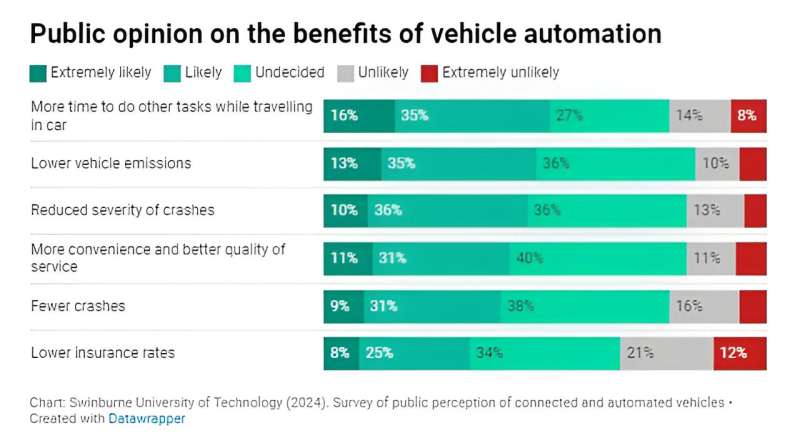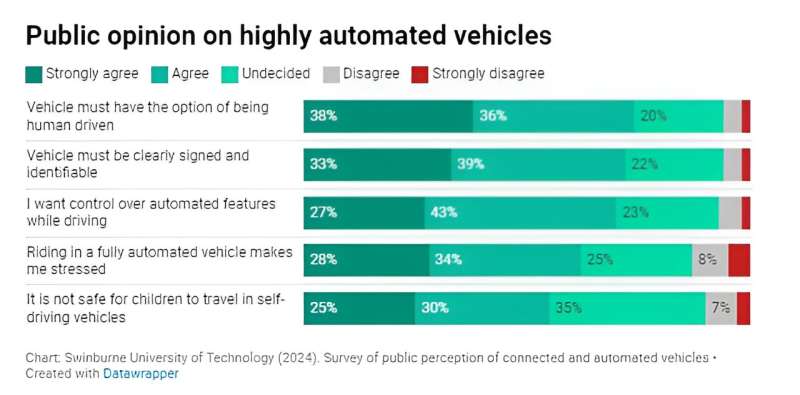This article has been reviewed according to Science X's editorial process and policies. Editors have highlighted the following attributes while ensuring the content's credibility:
fact-checked
trusted source
written by researcher(s)
proofread
Australians are open to self-driving vehicles, but want humans to retain ultimate control

A mob set fire to a Waymo self-driving taxi in San Francisco last month as residents' anger about the cars boiled over.
Self-driving "robotaxis" run by Waymo and other operators such as Cruise have been causing major concerns in the United States by failing to react properly to certain traffic situations.
So how do Australians feel about automated vehicles? To find out, we surveyed 562 people about their views on self-driving vehicles.
Overall, our findings showed good public support. Nearly half of our respondents saw autonomous vehicles as a desirable trend and travel option for Australians.
However, three-quarters wanted these vehicles to retain the option of being driven by a person. It's notable, too, how many respondents were undecided—consistently around a third or more—about the issues put to them.
So why the anger in the US?
Last October, a robotaxi operated in San Francisco by Cruise struck a pedestrian who had been knocked into its path by another vehicle. Instead of making an emergency stop, it dragged her about six meters along the road. Days later, the company said it would suspend all operations to examine its process and earn back public trust.
Waymo has also had some safety slips. Two Waymo cars crashed into the same pickup truck while it was being towed in Phoenix, Arizona, last December.
Tesla Autopilot has not been immune to repeated errors either. Last December, Tesla recalled more than 2 million vehicles to fix an Autopilot flaw. The recall followed an investigation by US regulators.
In a further blow to the industry, Apple is reported to have cancelled its secretive "Titan" project to build a self-driving electric car. Billions of dollars were reportedly sunk into the decade-long project.
Public acceptance of vehicles depends on trust
The industry now recognizes that creating self-driving vehicles is a much harder technical challenge than previously thought. As recent incidents show, public acceptance and trust are also going to be crucial for their success.
In our representative survey of 562 respondents from Melbourne, the overall results showed good public support.
Around 47% of respondents had a positive view of these vehicles as a desirable trend and travel option for Australians. Only 18% disagreed, though 35% were undecided. Another 47% said vehicle automation would reduce their driving workload.
Sentiment about the benefits of these vehicles was also positive. A majority (51%) believed automated vehicles will provide them with more time to complete other tasks while traveling.
There was also good support for the potential of these vehicles to improve safety and reduce vehicle emissions if they are electrified.
People do not want to surrender all control
Highly automated vehicles do not require any human intervention. Overall, however, respondents did not favor this level of vehicle autonomy.
A large majority (74%) felt these vehicles must have the option of being driven by a person. Giving complete driving responsibility to a computer would make 62% of respondents feel stressed. Around 70% said they would like to control where and when to use the automated functions, and which functions to use.
Around 72% believed automated vehicles must be made identifiable by, for example, a specific label, license plate or sign.

More than half (55%) thought it was unsafe for children to travel without an adult in a self-driving car.
These findings suggest most people are hesitant about entrusting all driving tasks to automation.
What other concerns do people have?
Around 80% of respondents were concerned about legal and financial liability in the event of a malfunction or crash. They had similar concerns about technology and system failures.
Respondents also raised concerns about how automated vehicles perform in bad weather conditions. Other issues included cyber security and data privacy.
Respondents emphasized concerns about the safety of automated vehicles in mixed traffic. Almost a third were strongly concerned about riding in a self-driving vehicle next to other automated vehicles.
Respondents also had concerns about how these vehicles will interact with other road users. Around 47% were strongly concerned about the safety of self-driving trucks in mixed traffic.
Respondents were more confident about the safety of automated public transport buses.
Ranking the barriers to public acceptance
We asked respondents to rank the barriers to public acceptance on a scale of 1 to 7 (1 is most significant and 7 least significant).

The most prominent concern (46% of respondents ranked it first) was technical reliability or trust in the technology. It ranked as the number-one barrier to public acceptance.
The high price tag of automated vehicles ranked second (31% of respondents). Legal issues (25%) ranked third. Then, in order, came concerns about cyber security, potential erosion of privacy, and technology maturity. Respondents ranked lack of regulations as their least concern—38% put it in seventh position.
Around 40% of respondents showed a strong willingness to buy an automated vehicle. Their main reasons were to reduce their carbon footprint and for safety.
Almost 47% said competitive purchase costs and lower insurance premiums would increase incentives to buy an automated vehicle. Premiums could fall because some studies expect these vehicles to be safer than human drivers.
What's next?
These findings enrich the debate on automated vehicle adoption in Australia by offering an understanding of public sentiment. The factors that sway public willingness to embrace these vehicles must be acknowledged. Policymakers, manufacturers and other stakeholders can then focus on resolving the concerns and responding to public desires.
Strategies such as live demonstrations and dedicated travel lanes and routes can help build trust. Financial incentives and policy to resolve legal liabilities are also likely to help foster the uptake of automated vehicles.
While fully autonomous vehicles remain elusive, many automated vehicle technologies available today can still be built into our cars to help improve safety, reduce driving load and emissions, and improve air quality.
Automated vehicles can play an important role in a sustainable transport future. But unless public concerns and barriers are addressed, travelers will remain skeptical of vehicle automation, and adoption of these vehicles will stall.
This article is republished from The Conversation under a Creative Commons license. Read the original article.![]()

















